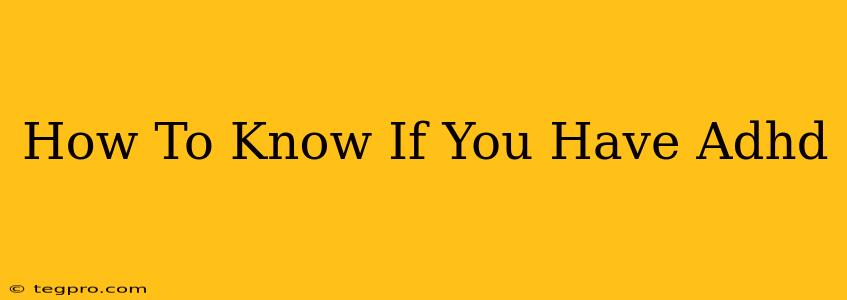Attention-Deficit/Hyperactivity Disorder (ADHD) is a neurodevelopmental disorder that affects millions worldwide. Characterized by inattention, hyperactivity, and impulsivity, ADHD can significantly impact daily life. But how do you know if you have it? This comprehensive guide will help you understand the signs and symptoms of ADHD in adults and children, and what steps to take if you suspect you might have it.
Understanding ADHD Symptoms: The Triad of Inattention, Hyperactivity, and Impulsivity
ADHD isn't just about fidgeting or being easily distracted. It's a complex condition with a range of symptoms that fall into three core categories:
1. Inattention: The Struggle to Focus
Symptoms of inattention can include:
- Difficulty sustaining attention in tasks or play: Struggling to stay on task, even when it's something you enjoy.
- Carelessness in schoolwork or work: Making frequent mistakes due to a lack of attention to detail.
- Difficulty organizing tasks and activities: Problems with planning, time management, and prioritizing.
- Difficulty listening when spoken to directly: Appearing not to hear or follow instructions.
- Difficulty following through on instructions and finishing schoolwork, chores, or duties: Starting tasks but rarely completing them.
- Difficulty sustaining attention in tasks or play: Losing focus easily, even in engaging activities.
- Often losing things necessary for tasks or activities (e.g., school materials, pencils, books, tools, wallets, keys, paperwork, eyeglasses): Frequent misplacing of essential items.
- Easily distracted by extraneous stimuli: Being easily sidetracked by external distractions.
- Often forgetful in daily activities: Frequently forgetting appointments, errands, or commitments.
2. Hyperactivity: The Constant Motion
Symptoms of hyperactivity might manifest as:
- Fidgeting or squirming in their seat: Restlessness and an inability to sit still.
- Leaving their seat in situations where remaining seated is expected: Inappropriate wandering or getting up frequently.
- Running about or climbing excessively in situations where it is inappropriate (in adolescents or adults, may be limited to subjective feelings of restlessness): Excessive physical activity.
- Difficulty engaging in leisure activities quietly: Finding it difficult to relax or engage in quiet activities.
- Acting as if "driven by a motor": Feeling constantly restless and on the go.
- Talking excessively: Excessive and often inappropriate verbalization.
3. Impulsivity: Acting Without Thinking
Impulsive behaviors can include:
- Blurting out answers before questions have been completed: Interrupting conversations frequently.
- Difficulty waiting their turn: Struggling to wait in line or follow social cues.
- Interrupting or intruding on others: Disrupting conversations or activities.
- Making hasty decisions without considering the consequences: Acting rashly and impulsively.
ADHD in Adults vs. Children: Recognizing the Differences
While the core symptoms remain the same, the presentation of ADHD can differ significantly between adults and children. Children may exhibit more obvious hyperactive behaviors, while adults might primarily struggle with inattention and impulsivity. Adults with ADHD might also experience:
- Difficulty maintaining relationships
- Problems with time management and organization
- Low self-esteem
- Increased risk of substance abuse
- Emotional dysregulation
When to Seek Professional Help
If you're concerned that you or your child might have ADHD, it's crucial to seek a professional diagnosis. A qualified healthcare professional, such as a psychiatrist, psychologist, or pediatrician, can conduct a thorough evaluation to determine if ADHD is present. Self-diagnosing is not recommended. A proper diagnosis involves a comprehensive assessment that takes into account your medical history, developmental history, and current symptoms. Treatment options, which may include medication, therapy, or a combination of both, are available and can significantly improve quality of life.
Beyond the Symptoms: The Impact of ADHD
It's important to remember that ADHD is more than just a list of symptoms. It can significantly impact various aspects of life, including academic performance, career success, relationships, and overall well-being. Early diagnosis and appropriate intervention can make a substantial difference in managing the challenges of ADHD and maximizing one's potential. Don't hesitate to reach out for help if you suspect ADHD might be affecting you or someone you care about.
This information is for educational purposes only and should not be considered medical advice. Always consult with a qualified healthcare professional for diagnosis and treatment.

